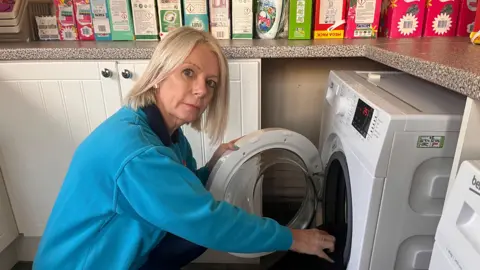The laundry bank helping families struggling to dry clothes
 BBC
BBCFood pantries have become a common way of helping families struggling with rising costs but now laundry banks are helping people who can't afford to wash and dry their clothes.
At Old Kilpatrick Food Parcels (OKFP) in West Dunbartonshire, there are three washing machines and two tumble dyers in a small room to help those who can't afford the high cost of energy prices.
"The cost-of-living crisis is hitting families in the basics of human life", says Maureen Cummings, the founder of OKFP.
"Washing and drying your clothes shouldn't be classed as a luxury or something that's unaffordable to do," she says.
OKFP runs a private laundry service for clients who need it most.

"We work on referrals, or it can just be word of mouth from someone who is aware that there's a family in the community that are struggling." Ms Cummings says.
"Volunteers do the laundry for them while they enjoy lunch in the café and just take a bit of pressure off."
Ms Cummings says many locals live in high-rise flats or apartments with no space for a tumble dyer – making clothes drying difficult.
And that's before the rising cost of energy prices are even considered.
"When you've got heavy jackets and sweatshirts and jeans and you're trying to dry them at home, it can take two or three days or longer in some cases," Ms Cummings says.
"And then the clothing has an odour to it.
"We had a family who approached us because their teenagers were being bullied at school because their clothing smelled.
"Even people who do have the luxury of a tumble dryer are very reluctant to use it."
To compound the issue, household bills will rise further in April after the energy regulator Ofgem announced a higher than expected increase in its next quarterly price cap on Tuesday.
The 6.4% increase in April means a household using a typical amount of gas and electricity will see their annual bill rise by £111 a year, or £9.25 a month, taking the total bill to £1,849 a year.
The new rate will apply to the bills of 27 million households in Scotland, England and Wales.
Old Kilpatrick's food pantry service users have doubled in the last two years to more than 1,000 a month but the laundry service remains restricted - again due to costs.
"We wouldn't be able to cope with the demand because we also have energy bills that are through the roof," Ms Cummings says.
She says politicians need to do more to help those who are struggling.
"There are loads of community buildings out there that, for a very low cost, could have a similar set up," she says.
"If the government is not going to do something about the energy bills then at least help those on the ground find a solution, whether it would be vouchers or assistance for local groups to set up a private laundry."

Not everyone has access to a local laundry bank or community laundry facility.
Mum-of-four Lynsey Boyd struggles to keep up with the cost of keeping a big family in clean clothes.
"There's always washing to be done," she says. "I've always got the heating on - just to dry the clothes quicker."
The part-time dinner-lady from Musselburgh has seven-week-old twins who go through plenty of bibs and baby-grows as well as two school-age daughters, who also generate a lot of dirty washing.
With less use of the washing line outside over the colder months, Lynsey relies on her tumble dryer and a clothes horse next to the radiator.
"The tumble dryer is not on every day, but it is on more," she says.

The 38-year-old, who receives universal credit, says she has noticed a rise in costs over winter.
"It's been like an extra hundred pounds just on top of my usual. You're having to juggle what you're going to pay and then what you're going to pay next.
"You have to money manage - but it's not always easy."
To save money, Lynsey takes advantage of cheaper off-peak rates from her energy provider.
"I usually try and do the tumble dryer at night-time just because it has always been cheaper - or more so at the weekend."
She balances her budget but has struggled in the past. "Sometimes I tend to find that maybe I've had to pay for my bill a month in arrears just because it's trying to catch up. And you don't really get much help from the government to pay your bills."
